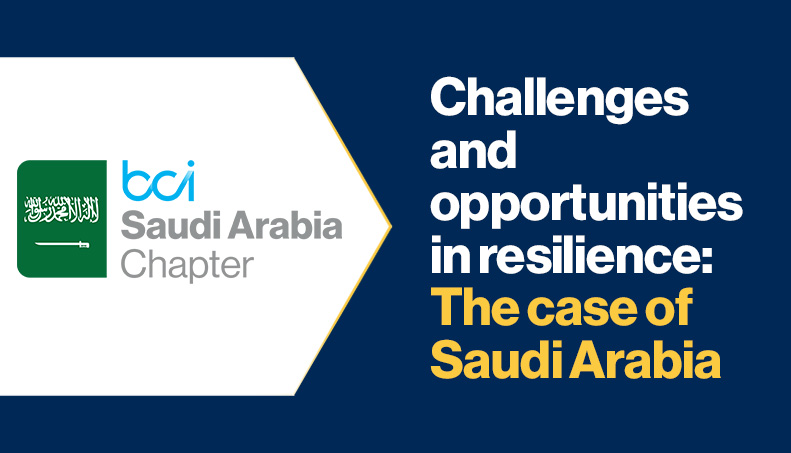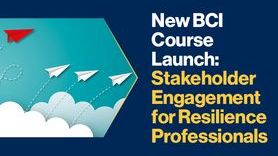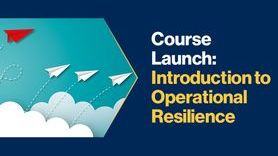Challenges and opportunities in resilience: The case of Saudi Arabia

The field of resilience has changed significantly in Saudi Arabia over the past few years. This is mainly due to global trends in risk management, regional regulatory updates, and economic diversification. This has led to considerable challenges, but at the same time, a wealth of opportunities to strengthen resilience in Saudi Arabia.
Key opportunities to build resilience
The government’s Vision 2030 initiative aims to reduce Saudi Arabia’s reliance on oil, focusing instead on promoting developing sectors of technology, tourism, and entertainment. Alongside this shift, regulatory improvements have introduced stricter business continuity and resilience regulations to support operations in adverse conditions. For example, the National Risk Council and the Saudi Digital Government Authority have issued regulations mandating all governmental entities to implement business continuity.
Other key changes tackled by organizations in Saudi Arabia in recent years have included heavy investment in infrastructure that’s resilient to man-made and natural disasters, and the COVID-19 pandemic. In Saudi Arabia, many organizations shifted to home working during the pandemic and found that supply chain disruption and changing consumer behaviours became more prominent risks during this period.
Some of the challenges currently faced by practitioners in Saudi Arabia are awareness and buy-in from top management. This is due to a lack of awareness around resilience planning, potential cultural barriers, and varying attitudes to risk that may overlook threats. This in turn leads to insufficient resource allocation to resilience-related activities. In addition to this, there is also a skills shortage in resilience which can pose challenges to filling roles even when the funding is available. However, despite these challenges, resilience practitioners are succeeding in raising awareness.
Chapter Leader Atiq Bajwa said:
“Awareness of business continuity and resilience has grown among Saudi businesses, leading to more investment in training and development programmes to equip employees with risk management skills. Overall, the concept of business continuity is more prominent than it was in the past and there’s increased awareness of business continuity and resilience in Saudi Arabia.”
Key issues for business continuity & resilience practitioners
Saudi Arabia has seen major technological advancements recently, with leaps in the adoption of artificial intelligence and cloud computing. As a result, Saudi Arabia’s resilience professionals are considering cyber resilience one of their top priorities. Other significant threats include volatile geopolitical instability, natural disasters and climate risks including floods and droughts, pandemics and health crises, and regulatory changes.
These risks require comprehensive and dynamic business continuity and resilience strategies. Organizations in Saudi Arabia must therefore focus on robust risk management (including managing the perception of risk), the integration of technology to enhance resilience processes, continuous regulatory compliance, and effective crisis management to build a resilient business environment.
The introduction of the Good Practice Guidelines (GPG) in Arabic benefits practitioners by enhancing accessibility and breaking down language barriers. The Arabic GPGs help to broaden the reach of business continuity best practices, ensuring native Arabic speakers can better understand the guidelines and effectively implement them in their organizations. The new Saudi Arabia Chapter also aims to support business continuity practitioners working with these threats.
BCI Saudi Arabia Chapter as an aid to practitioners
The Saudi Arabia Chapter supports practitioners with a robust framework for engagement, knowledge sharing, and professional development by networking, hosting meetings, workshops, and conferences so practitioners can discuss best practice and learn from each other. It also aims to foster partnerships between organizations and industries to support development of comprehensive resilience strategies whilst advocating for supportive policies and regulations.
The chapter will facilitate engagement with the BCI’s globally recognised certification programmes, ensuring practitioners can build and maintain high standards of professional competency, as well as providing guidance and support tailored to regional threats. These initiatives will collectively enhance the capabilities of business continuity practitioners in Saudi Arabia, helping them effectively manage and mitigate existing and unforeseen threats to their organizations.
As already discussed, the BCI Saudi Arabia Chapter is an excellent opportunity for practitioners in the region to share best practice and create support networks.
Leader Atiq Bajwa adds: “By addressing challenges through targeted activities, the BCI Saudi Arabia Chapter aims to enhance the resilience and continuity capabilities of organizations across the region, ensuring they are better prepared for various threats and disruptions. This proactive approach will create a more resilient and better prepared business environment in Saudi Arabia.”
Vice Leader Mohamed Abuelqroush added: “The Chapter aims to reflect a dynamic and integrated approach to business continuity and resilience in line with Saudi Arabia's broader goals of economic transformation and modernisation.”
The leading sectors developing business continuity and resilience in Saudi Arabia
Several key sectors in Saudi Arabia are leading the way in developing strong business continuity and resilience strategies. These include government departments via new regulations issued by the National Risk Council and DGA (Digital Government Authority) and financial services, which are highly regulated and mandated to have business continuity plans by the Saudi Central Bank. The established oil and gas sectors have extensive history of developing BC plans, as well as other sectors such as utilities (water, electricity) telecoms, and healthcare.
The Saudi Arabia Chapter aims to ensure business continuity and resilience is opened up to the wider sectoral community.
A Chapter look ahead
To advance business continuity and resilience in Saudi Arabia, strengthening cyber resilience and conforming or aligning to appropriate industry and regulatory standards are necessary for consistency and compliance. More training and exercising to raise awareness are a top priority, alongside enhanced collaboration and knowledge sharing amongst professionals. In addition, tailoring strategies to local cultural, economic, and environmental contexts will improve their effectiveness, such as diversification of the supply chain to reduce single dependencies, and the use of local supplies to minimise disruption.
Focusing on these areas will significantly strengthen future resilience in Saudi Arabia and the region, helping organizations better handle threats and disruptions while ensuring continuity and stability.
The BCI Saudi Chapter launched in April 2024 with the aim of enhancing knowledge and capabilities of professionals and supporting the business continuity and resilience community in the region. You can join this proactive Chapter here.








































